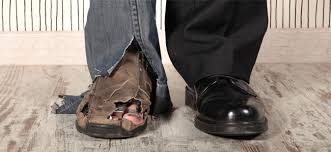The single-biggest lesson from this awful presidential election
Americans don’t care all that much about trade deals, immigration policy or bank regulation. Sorry, they just don’t. But they care a lot about their own well-being, and when they’re frustrated, arcane policy matters become proxy battles for what’s really ailing voters.
That’s happening now. Voters are obviously agitated, but it’s hard to believe it’s because they‘ve studied up on the Trans-Pacific Partnership or the Gang of Eight immigration plan, and found them abhorrent. Immigration and trade became flash points because Donald Trump, the Republican presidential nominee, ignited them. And they were ready to burn because a lot of voters are looking for somebody or something to blame.

For what? For the same thing that’s often behind political turmoil: falling living standards. The whole country isn’t falling behind, but enough of it is to rattle the entire political establishment, from Bernie Sanders’ surge on the left to Trump’s capture of the Republican Party on the right. For all the madness of this campaign, we may end up with a status-quo outcome after all, if Hillary Clinton ends up winning. But it would be a huge mistake for Clinton or anybody in politics to forget the message voters have been sending.
A tougher road to prosperity
The most important takeaway from 18 months of campaigning is this: too many Americans are falling too far behind. It’s no longer a temporary situation caused by a business-cycle downturn. It’s a chronic condition parents worry could affect their kids, and their kids’ kids. Prosperity is no longer a shared national goal. It’s a condition some families enjoy while others look in from the outside, and figure they’ll never experience what’s going on in there.
This doesn’t mean there will be blood in the streets. But it does mean the nation’s leaders have failed to address an epic economic challenge that will affect more and more of us the longer it goes unresolved. Pathways to success in the United States have become serpentine, poorly marked and clogged. It’s harder to get to the other side without a guide or a ride.
Each of the most hotly contested issues in the campaign has been a stand-in for elusive prosperity. Trade became controversial because it’s a simple way to explain why corporate interests are doing fine while hard-working people aren’t. Immigration, both legal and illegal, provides an answer if you’re wondering who took the good jobs Americans used to have. Bankers are an easy target because they have more money while the working class has less, leading to the easy inference that Wall Street has fleeced Main Street.
The real problem is a lot more complicated than these oversimplified explanations make it sound. Free trade and outsourcing probably have something to do with the loss of low- and middle-skill jobs, especially in manufacturing. But so does new technology, and if you shackle innovation to protect jobs, you end up even more behind. Immigration may push down pay for some workers, but it’s also a key supply of labor at a time when the economy needs it. And bankers who move money around for a living still help the economy in vital ways, by making capital available for businesses at rates they can afford.
How many Americans are hurting from the loss of working-class jobs and stagnant growth? It’s impossible to know, but probably many millions. Median household income, adjusted for inflation, hasn’t grown since 2000, which means some people have gotten ahead but the typical American hasn’t. That’s an awful state of affairs. The unemployment rate is a “healthy” 4.9%, but there are perhaps 9 million working age men who aren’t even trying to get a job, for a variety of reasons. They’re not counted in that 4.9%. The US economy can limp along with these handicaps, but it can’t thrive.
There are policies in place to help workers harmed by offshoring, recession and other misfortunes. They’re outdated and insufficient. The US economy needs new digital-era programs to turbocharge business development, raise the skill level of everybody willing to work for it and bring the world’s best ideas to America. The return on every tax dollar needs to be higher. In some cases, Washington needs to get out of the way. The same is true of state and local governments.
These are tough changes possibly beyond the capability of self-interested politicos in Washington. So the next president may give four years’ of lip service to more-inclusive prosperity, without changing much. If free trade emerges as a big campaign issue in 2020, you’ll know why.
Rick Newman is the author of four books, including Rebounders: How Winners Pivot from Setback to Success. Follow him on Twitter: @rickjnewman.

